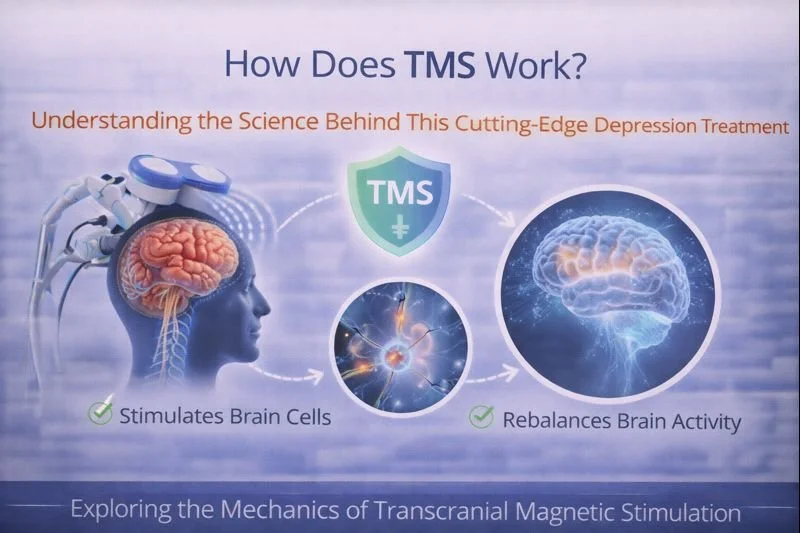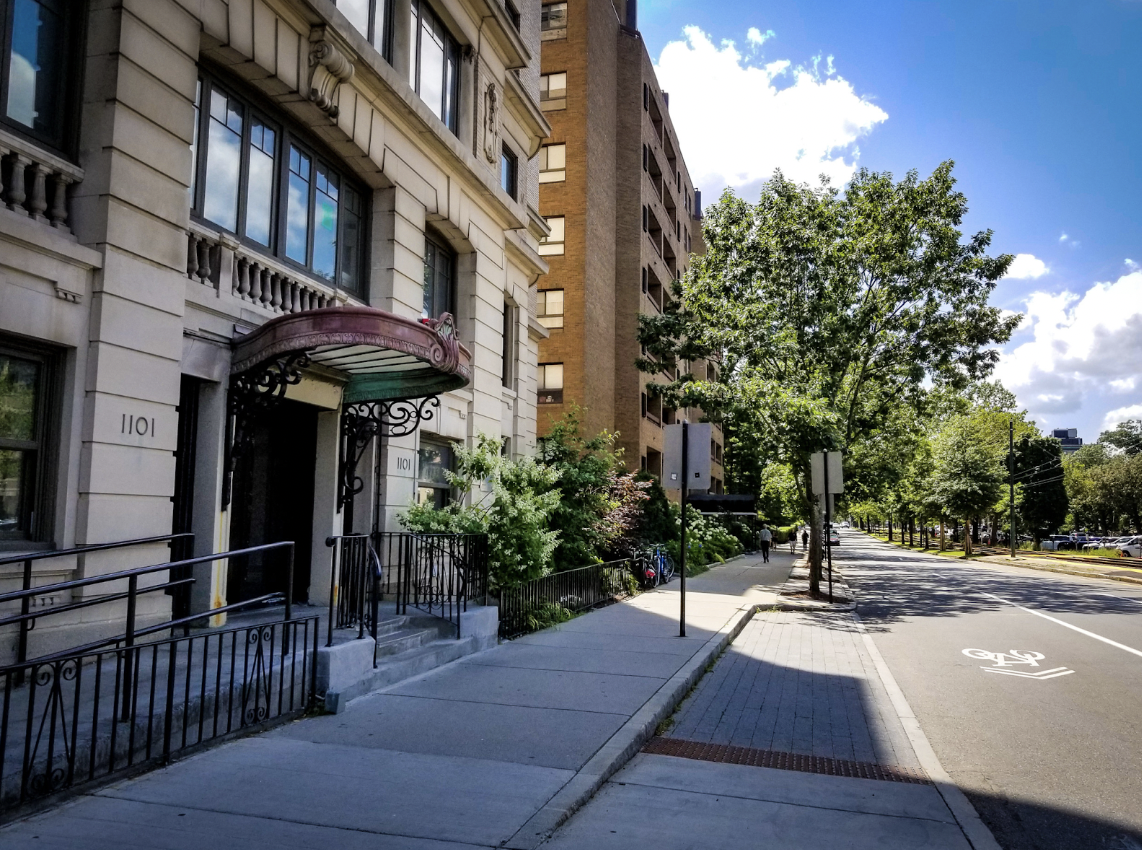How Does TMS Work? Understanding the Science Behind This Cutting-Edge Depression Treatment
Understanding TMS Therapy: A Revolutionary Approach to Depression Treatment
Transcranial Magnetic Stimulation (TMS) is transforming the way we treat depression, offering a non-invasive, drug-free alternative for those who haven’t found relief with traditional treatments. If you’re searching for TMS therapy in Boston, you may have questions about how it works, its effectiveness, and where to find the best providers. This guide will walk you through the science of TMS, its benefits, and why Dignity Brain Health in Brookline, MA is a top choice for TMS treatment in the greater Boston area.
What Is TMS Therapy?
TMS therapy is an FDA-approved treatment for major depressive disorder (MDD) and other mental health conditions. It uses magnetic pulses to stimulate areas of the brain responsible for mood regulation. This non-invasive procedure is performed in a clinical setting and does not require anesthesia.
Understanding Depression and Brain Function
Depression is a complex neurological condition often associated with dysfunction in brain circuits that regulate mood, emotion, and cognition. One key area affected is the dorsolateral prefrontal cortex (DLPFC), responsible for decision-making, emotional regulation, and cognitive flexibility. In people with depression, activity in this region is often significantly reduced.
How TMS Therapy Works
Transcranial Magnetic Stimulation (TMS) is a non-invasive treatment that applies high-frequency magnetic pulses to the DLPFC, reawakening and strengthening neural connections that have become underactive. These pulses generate small electrical currents that help:
1. Increase Neuroplasticity
Neuroplasticity refers to the brain’s ability to adapt, change, and form new connections. TMS encourages this process, making it easier for the brain to establish healthier neural pathways and improve emotional regulation.
2. Boost Neurotransmitter Production
TMS has been shown to enhance the levels of key neurotransmitters such as dopamine, serotonin, and norepinephrine, which play a crucial role in mood regulation. Many antidepressant medications aim to boost these chemicals, but TMS achieves this without systemic side effects.
3. Normalize Brainwave Activity
Research indicates that depressed individuals often show imbalances in brainwave activity. TMS helps restore balanced electrical activity, leading to improved mood, focus, and energy levels.
4. Strengthen the Mind-Body Connection
Since depression can also affect motor functions and physical well-being, TMS enhances communication between different brain regions involved in both emotional and physical responses to stress.
The Effectiveness of TMS Therapy
The success of TMS therapy depends on the precise targeting of the DLPFC, as well as the frequency and intensity of the pulses. Studies show that repeated exposure over multiple sessions leads to long-term improvements, often outlasting the effects of traditional antidepressants.
Why Choose TMS Over Medication?
Unlike medications that affect the entire body, TMS precisely targets brain regions involved in mood disorders, making it an excellent option for individuals with medication-resistant depression.
Benefits of TMS Therapy
TMS therapy offers numerous advantages over traditional treatments for depression, including:
✅ Non-invasive and drug-free – No medications, no sedation, and no major side effects.
✅ High success rates – Clinical studies show 60-70% of patients experience significant improvement, with some achieving full remission.
✅ Minimal downtime – Patients can drive themselves to and from sessions and resume normal activities immediately.
✅ Long-lasting results – Many patients report sustained relief from depression symptoms after completing a TMS treatment course.
Who Can Benefit from TMS Therapy?
TMS therapy is ideal for individuals who:
Have been diagnosed with major depressive disorder (MDD).
Have tried two or more antidepressants without success.
Experience intolerable side effects from medications.
Seek a non-invasive, drug-free alternative for depression treatment.
If you’re wondering, “Where can I get TMS therapy in Boston?”, Dignity Brain Health in Brookline, MA is a trusted provider offering cutting-edge TMS treatments in a compassionate and professional setting.
What to Expect During TMS Treatment
If you’re considering TMS therapy, here’s what the process typically looks like:
1. Initial Consultation
Your journey begins with an evaluation at Dignity Brain Health to determine if TMS is right for you. Our Boston TMS specialists will review your medical history and discuss your treatment goals.
2. Treatment Sessions
Each session lasts around 20-30 minutes.
You’ll be seated in a comfortable chair while a TMS coil is placed on your head.
Magnetic pulses stimulate brain activity, with minimal discomfort.
Most patients complete a 6-week course (5 sessions per week).
3. Monitoring Progress
Many patients notice improvement within a few weeks.
Regular assessments ensure optimal results.
Some patients may require occasional maintenance sessions.
***
🌟 Looking for TMS Therapy Near You? Where to Get TMS Therapy for Depression in Boston
📍 Conveniently located near:
✅ Boston, Cambridge, Newton, Alston, Somerville, & Back Bay
Dignity Brain Health - TMS Therapy Clinic
💡 Why Choose Dignity Brain Health for TMS?
✔️ Expert Boston TMS Specialists – Harvard Medical School-trained; Treating depression with TMS since 2017.
✔️ Personalized Treatment Plans – Tailored to your unique mental health needs.
✔️ Insurance-Friendly Process – We handle the paperwork for you.
✔️ Proven Results – TMS can improve symptoms for patients who haven’t responded to medication.
📅 Take the First Step Toward Relief
👉 📆 Find Out If TMS Is Right for You; Book Your TMS Consultation Now (Insurance-Covered)
💬 Still have questions? Contact us today and speak with a specialist about whether TMS therapy is right for you!
***
🌍 Mental Health Resources in Boston for Depression & TMS Therapy
If you or a loved one are struggling with depression, these trusted resources in Boston offer professional support:
🔹 Massachusetts General Hospital Psychiatry Department – Offers psychiatric evaluations, therapy, and medication management for depression and anxiety.
🔹 Boston University Center for Psychiatric Rehabilitation – Specializes in mental health recovery programs, vocational rehabilitation, and outpatient services.
🔹 Samaritans Boston (Suicide Prevention) – A free 24/7 crisis helpline offering confidential emotional support.
Dignity Brain Health is committed to helping patients find the best mental health care in the greater Boston area.
References
George, M. S., Lisanby, S. H., & Avery, D. (2010). Daily left prefrontal transcranial magnetic stimulation therapy for major depressive disorder: A sham-controlled randomized trial. Archives of General Psychiatry, 67(5), 507–516. https://doi.org/10.1001/archgenpsychiatry.2010.46
O’Reardon, J. P., Solvason, H. B., Janicak, P. G., Sampson, S., Isenberg, K. E., & Nahas, Z. (2007). Efficacy and safety of transcranial magnetic stimulation in the acute treatment of major depression: A multisite randomized controlled trial. Biological Psychiatry, 62(11), 1208–1216. https://doi.org/10.1016/j.biopsych.2007.01.018
Pascual-Leone, A., Rubio, B., Pallardó, F., & Catala, M. D. (1996). Rapid-rate transcranial magnetic stimulation of left dorsolateral prefrontal cortex in drug-resistant depression. The Lancet, 348(9022), 233–237. https://doi.org/10.1016/S0140-6736(96)01219-6
Perera, T., George, M. S., Grammer, G., Janicak, P. G., Pascual-Leone, A., & Wirecki, T. S. (2016). The clinical TMS Society consensus review and treatment recommendations for TMS therapy for major depressive disorder. Brain Stimulation, 9(3), 336–346. https://doi.org/10.1016/j.brs.2016.03.010
Mayo Clinic. (2022). Transcranial magnetic stimulation (TMS). Mayo Clinic Health System. Retrieved from https://www.mayoclinic.org/tests-procedures/transcranial-magnetic-stimulation/about/pac-20384625
—
CONTACT INFO:
DIGNITY BRAIN HEALTH
1101 BEACON STREET, SUITE 8W
BROOKLINE, MA, 02446
UNITED STATES
Phone: (617) 855-7288




